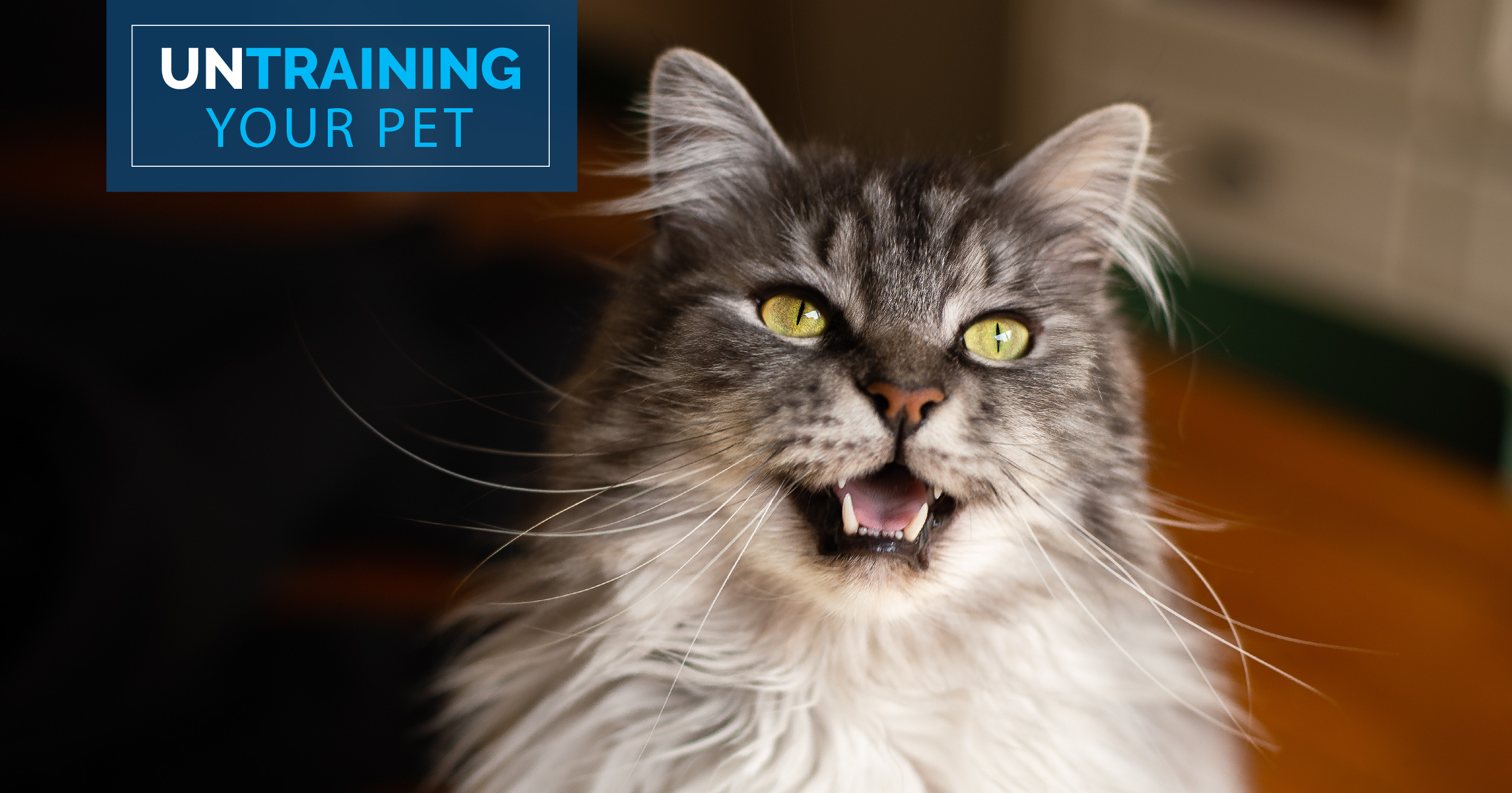
Welcome to our “Untraining Your Pet” series, where we help you “untrain” your pet from those naughty or annoying bad habits and get them back to being the goodest boys and girls.
Are you awakened during the night by relentless wails and open your eyes to find a small furry thing with glowing eyes staring at you? It probably takes you a few seconds to realize that no, you’re not in a horror movie — it’s just your cat. It’s certainly not the most relaxing way to be woken up, especially when it’s hours before your alarm goes off.
Your cat probably has a reason for their middle-of-the-night meows — the trick is working out what that reason is. Are they bored, hungry, playful, or do they have something else going on that your veterinarian should check out? We’ll go through some of the possibilities for your cat’s midnight meows and suggest some ways to help untrain them from this sleep-disrupting habit.
It’s Because Cats Are Nocturnal, Right?
It’s a popular myth, but cat’s aren’t nocturnal, they’re crepuscular. Originating from the Latin word crepusculum, which means twilight, crepuscular animals are most active at dawn and dusk. Your cat may have their own definition of “dawn” and “dusk” though…
Is Everything Good in Their World?
Cats like to have everything juuuust right. So it’s possible that their late-night calls are to complain about something being amiss with their environment. Do they have enough food? Is their water bowl full and clean? If they get hungry during the night, try giving them a food puzzle before you go to bed so that they’re entertaining themselves and snacking at the same time. Or you could use a timer food box that distributes food in the middle of the night so you don’t have to.
Cats (particularly older cats) can be very particular about their bathroom space and will let you know when a dirty litter box is not up to their standards. So your pre-bedtime routine might want to involve scooping the litter box.
A safe place to hide is also important for cats. If your kitty is feeling anxious and doesn’t have a place they feel comfortable escaping to, this might be why they want your attention. Their bed should be in a quiet place that is away from other pets. They should also have plenty of opportunities to fulfil their natural climbing and scratching instincts.
On the Hunt for a Peaceful Night
If you think your cat’s trying to wake you up to play with them, forestall their request by having an energetic play session before bed. You can engage their brain and their muscles by getting them to act on their natural hunting instincts. For example, feathers on a wand can look like a bird and get your cat leaping after it. A wind-up mouse can get them chasing it all around the room and a flopping fish toy will have your cat pouncing on their prize catch.
A laser pointer can mimic the movements of prey while giving your cat a good workout running all over the house, across furniture or up and down their cat tree. Whichever hunting method you choose, make sure you throw them a treat or kibble occasionally so that they feel like they successfully made a “kill” and can celebrate their hunt.
It’s also a good idea to leave out some self-play toys so that if they get bored during the night, they will (hopefully) play with those instead of meowing for you. Make sure you rotate the toys every few days so your cat doesn’t become bored playing with the same toys all the time.
Sweet Catnip Dreams
If your cat is full of beans and zooming around the house in the late evening, you could try giving them some catnip. For some cats, catnip makes them feel mellow and calm — sprinkling their bed with catnip at bedtime could help them feel relaxed and ready for sleep. You may want to test it out earlier in the day, though, as some cats experience aggressive playfulness instead — definitely not what you want before bedtime. It’s also possible that catnip won’t affect your cat at all.
A Noisy Kitty Could Be a Sick Kitty
If behavioral and environment issues don’t seem to be the reason for your cat’s midnight meows, it’s possible that there is a medical reason for them, especially if you notice other symptoms along with it. Hyperthyroidism (overactive thyroid), kidney disease and hypertension (high blood pressure) can all cause increased vocalizations in cats. A checkup with your veterinarian can help rule out (or confirm) a medical reason for your cat’s nighttime meows.
If you have a senior cat that meows loudly at night, they could have cognitive dysfunction syndrome (CDS). Indoor Pet Initiative (at Ohio State University), explains that a diagnosis of CDS is made when cats have cognitive decline (dementia) that isn’t due to a medical disease. There is no cure for CDS, but environmental enrichment, diet changes or medication may slow its progression.
But I Reawwy Miss You
If you’ve ruled out all of the other things we’ve talked about here, it’s possible that your cat just really wants your attention. There are two options here: give in or ignore them. The problem with giving in is that you’re rewarding their behavior. So now that they know you’ll respond to their nighttime meows, they’ll keep meowing until you get up. If you ignore their attention-seeking behavior, over time they should learn that all that meowing is not getting them anywhere and they’ll stop.
Hopefully these tips help you get a full night’s sleep and your cat’s needs met. If your cat is still meowing all night, ask your veterinarian or an animal behaviorist for advice.
RELATED POST: 5 Reasons Your Cat Sleeps with You
